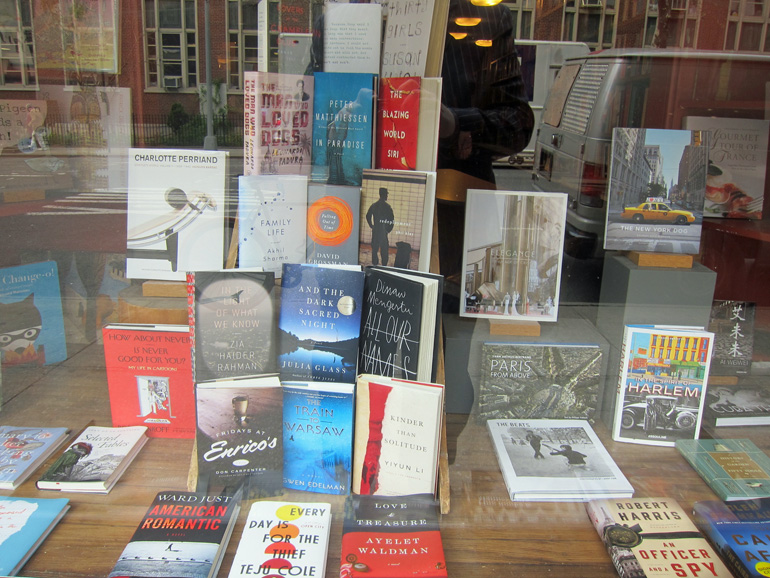
On the surface, of course, Roz Chast’s Can’t We Talk About Something More Pleasant? is just a cartoon, or a book of cartoons, executed in her trademark scratchy style, and sounding the same kind of humor. People living humdrum lives are made to look crazy by an artist who passionately believes that you have to be crazy to live a humdrum life. As soon as possible, Roz Chast escaped the world of dingy paint, funny smells, and screaming tenants that she grew up in, and she has been entertaining us for over thirty years with the brilliantly-captioned drawings with which she offloads her dreary memories. Woody Allen’s alter egos joke in several movies about their mothers’ gift for removing all the flavor from the food they cooked. Until very recently, Roz Chast didn’t talk about her parents, but it is no surprise to learned that they were expert at taking the fun out of everything. That’s not quite right: Elizabeth and George Chast had a lot of fun on their own. But it was their own private brand of fun, one that they did not try to share with their daughter — who wouldn’t have shared it, anyway. For her — for Roz Chast — childhood was a bleak Gobi Desert of dull joylessness, periodically interrupted by her mother’s critical outbursts — self-styled “Blasts from Chast.”
What sort of book might she have written if her parents had died earlier, and more suddenly, after brief stays in the hospital or perhaps at home in bed? I am not sure that she would have written about it at all; she would simply have gone on producing drawings inspired by her memories. But Elizabeth and George did not die like that. Elizabeth lived to be 97, and George (born in 1912 just a week or so before her) made it to 95. They lived to be too old to take care of themselves. They lived to be so old that their only child had to take care of them. Elizabeth, sensing perhaps (the thought just occurred to me) the book that would be the ultimate result, stubbornly resisted her daughter’s attempts at intervention, but the complications of a fall (from a stepladder) ultimately forced her to concede dominion. She consented to take George to settle in what is no longer called an old folks’ home. George lasted about six months; his senile dementia was already far advanced upon arrival. Elizabeth lived on for another two years. That doesn’t sound like a very long time, but anyone who can remember what it is like to have lived with a two-and-a-half year-old child since its birth know what an eternity can be compressed in an apparently short span.
Elizabeth’s longevity was complicated by the fact that, to understate, she was not her daughter’s favorite parent. By profession an assistant principal in New York City’s public elementary schools, Elizabeth was no fan of children generally — perfectly normal in a day when adults were expected to represent the opposite of everything that children were being taught to outgrow. Having a child was a duty to be discharged responsibly, but not necessarily with displays of warmth. Elizabeth prized her own hard-headedness, her inborn resistance to dreamy speculation of any kind. She was a “no-nonsense” sort of person, which is hardly objectionable in itself. But as a mother, at least in her daughter’s account, she was an enforcer of tedium, a monster of banality.
(The muffled voice of Elizabeth’s ghost will be heard to bellow, “Tedium Schmedium! George and I were world travelers! We even went to the Galápagos Islands!” Aside from the mention of this trip, however, and of two others to Israel, Chast’s exclusion of this aspect of her parents’ life is troublingly sonorous.)
Elizabeth’s daughter believed that she took after her father, George. George was a born linguist but not good at much else. “Around the house,” he was a catastrophe, breaking everything that he handled. He seems to have been something of a hypochondriac, and he yielded gratefully to Elizabeth’s firm advice, no matter how minute the point. It would not be complete exaggeration to say that, for him, assisted living began with marriage, or, at any rate, soon after his service in World War II. To say that he was genial in comparison with his wife is not saying much, but in his daughter’s telling, he was given to smiling whenever he wasn’t panicking. A firm believer that “mother knows best,” he did not stand up for his child, or would probably not have done so had she thought to seek his support.
From a very early age, Roz Chast put her head down, and dreamed of growing up and leaving home.
And, when she did leave home, she left Brooklyn as well. For eleven years, from 1990 until 2001, she did not set foot in King’s County.
(Did her parents come to visit her in her new home in Ridgefield, Connecticut? They must have done, just to see their grandchildren, but we’re not told.)
When she did go back (two days before 9/11), she was appalled by the grime that had accumulated in her childhood home. That is the discovery with which Can’t We Talk About Something More Pleasant? begins.
***
The other day — in last week’s Home Section — Times reporter Sarah Lyall (excellent choice) paid a visit to the house that Roz Chast shares with her husband, in which she raised her two children. Photographer Randy Harris tagged along, and the images reproduced in the paper focus on the quirky things that Chast has acquired — one can almost hear her saying, with profound mockery, “curated” — over the years, such as the shelf of “amusing cans.” But the corner of the living room with the sectional sofa is inviting. Light, color, and simplicity govern the atmosphere. Considerations of interior design are muted, and somewhat subordinated to the art on the walls. There are lots of windows.
There are no windows in Chast’s drawings of her parents’ apartment. The only windows that I can find in Can’t We? appear in rooms at the assisted living facility, toward the end.
I can’t help thinking of this memoir as a book about homemaking, perhaps because there is so little of it in evidence. To me, homemaking is something that has to happen when two or more people are living together. Not just occupying the same residential unit but living together, and doing so with conscious self-expression. Homemaking creates a home — the anchor of your sense of self, the fixed abode from which “who you are” is free to explore the world. But it is also a place that is shaped, partly, by “who you are.” A home encourages its dwellers to live and to grow.
Without homemaking, a household is more like the slime that a snail leaves in its path, a residuum, a byproduct. It will be characterized for outsiders who visit it by thoughtlessness or heartlessness or both.
The arrivistes of the Victorian age were notorious for living together under pre-determined conditions, following conventions set by others. After World War I, sociologists and advertisers spoke of housewives as “homemakers,” but this was soothing flattery: housewives were expected to master and to practice “home economics” — a priceless redundancy. These oppressive environments did not amount to homemaking.
Chast tells us that her parents grew up in (relative) poverty, and that her more distant forebears endured terrible hardships. In such circumstances, staying alive would be the important thing. Elizabeth and George Chast seem never to have outgrown a certain hand-to-mouth disregard for the values that take hold when rude survival is no longer challenged. “Do not die” is in fact, the last item on Roz’s childhood “to-do” list. On page 29, there’s a “Wheel of Doom,” a sort of mandala to the inescapability of death, which can be brought on by playing the oboe or being hit by a falling flower pot.
When people live together, they eat together. Among Chast’s childhood recollections, Elizabeth’s gifts, or lack of them, as a cook are never alluded to. George’s self-diagnosed delicacy made him a picky eater, to say the least, and Chast, writing about the time he stayed with her in Connecticut while Elizabeth convalesced from the fateful fall, is almost merciless.
Dinner was tough. I felt as if I was dealing with a child who had never been taught how to behave normally at a table. It wasn’t much rudeness as his idiosyncratic approach to food, which was lifelong and unrelated to senility.
I loathed watching him cut with a knife. He didn’t plant the blade and saw back and forth while applying pressure. He sort of scraped away at whatever morself he wanted to place in his mouth. It was not only ineffective, but somewhat disgusting.
When I was growing up, all the serving utensils would always end up on his plate, which drove my mother bats.
Perhaps Elizabeth and George were beset by a superstitious fear that any attempt to live more comfortably than their parents had been able to do would amount to courting disaster. Perhaps Elizabeth and George did their “living” elsewhere — at work or on their travels. For whatever reason, though, they denied their daughter a true home. They fed and sheltered her, they looked after her health and her schooling. But although Roz lacked nothing important in a material way, she grew up in a spirit of domestic subsistence, of forever getting by. One has only to think of Francie Nolan, the heroine of A Tree Grows in Brooklyn and a girl familiar with real deprivation, to see what Roz Chast was missing.
Elizabeth must have sensed something of this when, not long before moving to Connecticut, she wrote one of her poems (now we know where Chast’s gift for mock-treacly greeting card verse comes from), this one about the apartment in which, no longer capable of traveling and long-since retired, she found herself stuck.
Her parents’ lives are empty
No excitement, no change,
As days melt into each other
In a stillness so strange.
They, who once traveled
All over the map,
Are forced to lie down
For their afternoon nap.
To be sure, this is in part the inanition of old age. But it also makes clear that excitement, change, and travel all involved leaving the house.
The brutality of the second half of Can’t We Talk About Something More Pleasant? lies in the immense difficulty that Chast experiences when it becomes her job to make a home for her parents. That she cannot share one with them is a given. That she must do so in the artificial terms of “assisted living,” with its monumental expense and its hired caregivers, is maddening, not least because her parents are almost completely beyond being able to take pleasure in life. She is old enough herself to foresee, and to dread, her own end.
I wish that, at the end of life, when things were truly “done,” there was something to look forward to. Something more pleasure-oriented. Perhaps opium, or heroin. So you became addicted. So what? All-you-can-eat ice cream parlors from the extremely aged. Big art picture books and music. Extreme palliative care, for when you’ve had it with everything else: the x-rays, the MRIs, the boring food, and the pills that don’t do anything at all. Would that be so bad?
She almost sounds like her mother — except for the books and music.
Can’t We Please Talk About Something More Pleasant? is, for the most part, a very funny read. But when it is over, it is the darker, unillustrated prose passages, together with the photographs of her parents’ abandoned apartment, that dwell in the mind. The sense of loss is matched by the sense of never having had. The reader ought to allow for an hour or two of grief.
Why, then, read this book? Why for the matter of that, write it? Certainly we are not dealing here with some sort of therapeutic transmutation of mourning into art. There is plenty of art, but it stoutly resists any transmutations. What it offers instead is an object lesson in how (not) to live, and a cry of pain for the importance of pleasure. By demanding no more of life than mere survival, Elizabeth and George Chast shortchanged themselves and did something much worse to their daughter. I don’t think that that “something worse” could be better described than it is in the fullness of Can’t We Talk About Something More Pleasant? Let it be a lesson to us all.




















